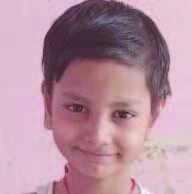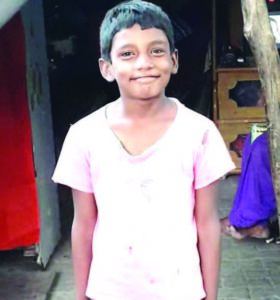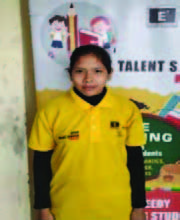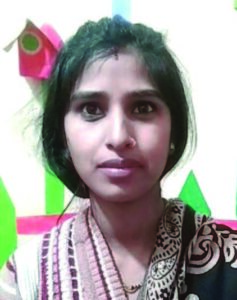Telling the tale: So as to document the ‘change’ in the lives of communities – the beneficiaries of social projects of companies and non-profits
In Focus: Project Shiksha and Project Jeevika by Hero MotoCorp
Project Shiksha
 Shivam, 5 years old
Shivam, 5 years old
Shivam is a 5-year-old student at the Shiksha centre in Dharuhera in Rewari, Haryana. He lives with his family in a slum area. His father is employed as a guard and his mother works as a domestic help at houses. The challenge for the couple was to leave the young boy back at home and eventually, on a neighbour’s recommendation, Shivam was admitted into the centre.
Within eight months of being enrolled, Shivam had learnt numbers, alphabets, names of animals, etc. He spent time drawing and painting while his mother was away at work. When lockdown was announced on account of Covid-19, his parents were added to a WhatsApp group by the centre, and daily tasks, reading materials, and links to educational content including YouTube videos were shared to keep the child connected and engaged with the learning process. His parents are grateful that Shivam has found access to preschool education even during the lockdown.
 Manoj, 11 years old
Manoj, 11 years old
Manoj lives in the slums of Khandsa village near Gurugram, Haryana. Both his parents are sweepers in a private company. Manoj had been at the Shiksha centre for about six months and was progressing quite well too, when the lockdown was announced. Unfortunately, he was unable to attend even the online classes which the remedial centre had started, as his parents did not have a smartphone.
To address the issue, which was being faced by many students from disadvantaged communities, Hero MotoCorp’s partners created a step-up book that Manoj and others in similar circumstances could read every day. Students were also expected to attempt all the given tasks in the book. Any doubts that Manoj has are cleared by the teacher over a phone call. The teacher also visits his home on a regular basis to check the progress made by him as well as to guide him on lessons. In the last visit, the teacher found that Manoj was taking a keen interest in his studies and had completed the assigned tasks well before time.
 Jyoti Samawat, Class 10 student
Jyoti Samawat, Class 10 student
With all educational institutions being closed during the pandemic, the remedial centres run under Hero Talent Search project also had to be called off for the time being. The company’s partners started online coaching classes for all beneficiary students. Jyoti Samawat, a Class 10 student at a government school in Jaipur, was among those who regularly attended the online classes and showed exceptional improvement in her academic performance.
Expressing her gratitude, Jyoti recounts: ‘My parents could not afford to send me to private coaching. Hero MotoCorp’s initiative to provide us coaching was a blessing for us. Moreover, the teachers made the subjects more interesting and helped me in learning many concepts.’
Project Shiksha focuses on upgrading the education ecosystem in the country. The objective of the intervention is to create an enabling and encouraging environment for imparting quality education at government schools in rural India.
The project complements the Right to Education Act by supporting the development of necessary infrastructure and pitching in with soft interventions. The idea is to pave the way for government schools in the rural to eventually match the performance and outcomes of privately run schools.
Over the years, Hero MotoCorp has constructed or refurbished school buildings, renovated classrooms and playgrounds, and provided furniture as well as basic resources like schoolbags, stationeries and books. In some schools that experienced regular power cuts, the company invested in installing solar-power plants for uninterrupted functioning.
As of today, many schools in the vicinity of the company’s plants boast of outstanding libraries, science laboratories, auditoriums and play areas including basketball and badminton courts.
Going beyond infrastructural development, the company has deployed professional non-profit entities to engage with these schools to provide career guidance to students and conduct motivational workshops and seminars.
The focus is also on remedial classes for students who are struggling to meet the demands of the curriculum. Through remedial education centres, the team ensures that students get additional academic sessions and perform better despite whatever socio-economic challenges they may be coping with.
Project Jeevika
 Renu Nodhi, Haridwar, Uttarakhand
Renu Nodhi, Haridwar, Uttarakhand
Renu Nodhi is a resident of Jwalapur village in Haridwar and a member of a self-help group called Narishakti. She along with her fellow SHG members attended the two-day virtual diya-making workshop conducted before Diwali. She was introduced to the various aspects that go into selling a product, including procurement, preparation, finishing, packaging, branding and marketing. Through the practical sessions, she and her fellow participants learnt various techniques of painting and decorating diyas, melting wax and making candles, etc. Members of her SHG collaborated with another SHG in the region and prepared diyas, which were then showcased and sold at various stalls in the city.
Renu believes that the training helped the group to start this venture. The appreciation that their diyas received from the community has given them the confidence to do this during future festive seasons as well.
 Alka Ben, Halol, Gujarat
Alka Ben, Halol, Gujarat
Alka Ben was a housewife whose life unfolded under the veil, within the closed walls of her house, until she joined one of the self-help groups that Hero MotoCorp helped set up. Over time, she gained confidence in her capabilities and borrowed Rs 20,000 from her SHG to invest in a buffalo. This step brought about a significant change in the family’s income. Alka now earns about Rs 5,800 per month and is also looking at an additional income from the sale of the compost that she has been making on her own using the dung and farm waste.
Today, Alka is a role model in the village whom others look up to and learn from.
 Bhavna Ben, Halol, Gujarat
Bhavna Ben, Halol, Gujarat
Bhavna is a housewife-turned-entrepreneur from a small village in Halol, Gujarat. Her husband lost his job during the lockdown and the family was left with practically no source of income to run the house. Bhavna knew tailoring and decided to do some work from home. She started making cloth masks as they were the need of the hour. For this, she borrowed money from the self-help group that Hero MotoCorp had set up and bought a sewing machine and some raw material.
Within a few days of starting her work, Bhavna received a major order to make masks for employees of a factory in the vicinity. There was no looking back for her after that and she not only started making masks but also started sewing PPE kits and expanded her work. Soon, three other members of her SHG joined her and now they together run a small yet profitable enterprise.
In Bhavna’s words: ‘I am so happy to be a part of the SHG, which is more like my extended family. It has given me a new identity and financial independence, and a lot of confidence. I am also grateful to Hero MotoCorp for initiating the SHG in our village. It has empowered the entire community.’
Project Jeevika has been conceptualised to address various social challenges and contribute towards the economic inclusion of women and youth from the lower social and economic strata of society. The project primarily develops employability skills of women and young people from underprivileged communities and thereby assist in their socio-economic empowerment.
Under the project, Hero MotoCorp has been supporting multiple education and training institutes that make the beneficiary groups employable in various trades in the automotive sector, especially the two-wheeler industry, in addition to facilitating short-term courses in fashion designing and accounting. Communication skills, financial literacy and developing the right attitude and ability to adapt to an organised working environment are also part of the curriculum in these courses.
Project Jeevika complements National Skill Development Mission as well as the Prime Minister Kaushal Vikas Yojana (PMKVY).
The primary components of Project Jeevika include:
Hero WeCare Centres of Excellence
These address emerging skill gaps, overcome skill demand-supply mismatch, and align training as well as research with industry needs. The centres are equipped to follow best practices to support skill training for specific sectors and also train the trainers, build their capacity, and establish a skilling ecosystem with the highest education standards.The Centres of Excellence provide one-year diploma courses with hands-on practical experience to the students, along with focused placement guidance and internships in automotive companies. Currently there are 10 operational centres across the country in cities like Delhi, Ambala, Hyderabad, Nellore, Vijayawada, Jaipur and Bengaluru.
Self-help groups for livelihood opportunities
Self-help groups (SHGs) have been widely appreciated for their contribution to inclusive development across rural India. Apart from making women financially independent, SHGs have also been playing a prominent role in addressing various social issues including gender-based discrimination, the dowry system and casteism.Hero MotoCorp has facilitated the formation of women’s self-help groups in various communities. The core activities undertaken by these groups are savings, internal loaning, rights-based social action, etc. Such activities are facilitated by partner organisations, who are following the company’s tested model for SHG formation in Halol, Gujarat. Some of these groups have been in existence for about three years and helped women in the village clusters of Halol in a) achieving financial independence as they now run their own enterprises, b) learning skills to manage finance, c) reaching a better standard of living, and d) acquiring a progressive approach with regard to their children’s upbringing and education.
In the last FY, 14 new SHGs were formed in 10 villages of Halol and brought 265 more women into the SHG system. Overall, 72 active SHGs in the region are being supported under Hero MotoCorp’s CSR. During the pandemic, these SHGs stitched nearly 5,000 face masks for the village communities.
The last FY also saw the company supporting 62 women’s SHGs in Haridwar. The members were trained in diya making and this helped them make additional earnings around Diwali festivities.
Entrepreneurship orientation
One of the significant components of Project Jeevika is entrepreneurship orientation for rural women, providing further boost to the company’s mission to enable real empowerment. Focused seminars, workshops and other such direct engagements are organised by their partners in rural India. The idea is to empower women by sharing information regarding entrepreneurship opportunities, business startups, women’s economic rights and education so that they can exercise their choices and challenge discriminatory practices.
Overall, more than 27,000 women from seven districts of Haryana – Mahendragarh, Rewari, Rohtak, Jhajjar, Bhiwani, Charkhi Dadri and Sonipat – were educated on various entrepreneurship programmes and business startup opportunities. More than 5,000 women received formal training on starting their own enterprises and were guided through the complete cycle of entrepreneurship.
This feature is part of CauseBecause’s continuing endeavour to understand, facilitate and document impact of social projects.
